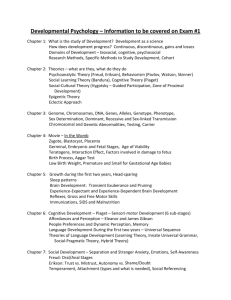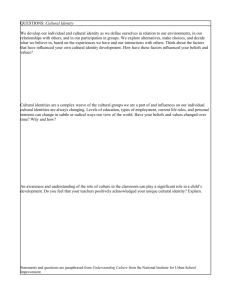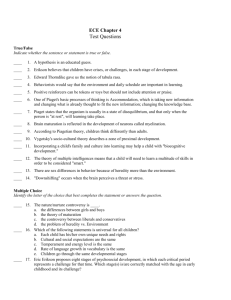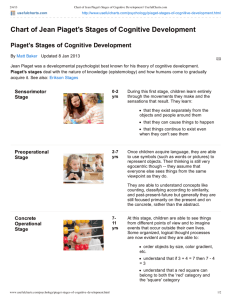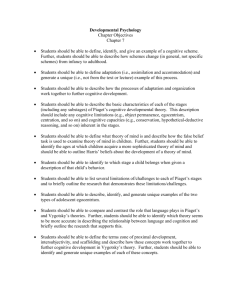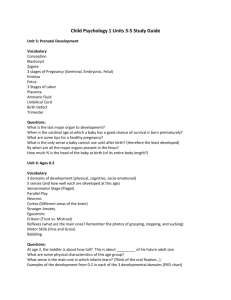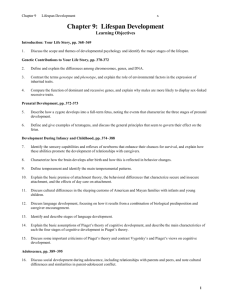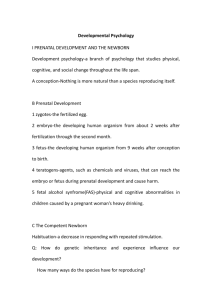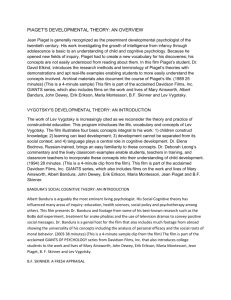Theories of Childhood Educators
advertisement
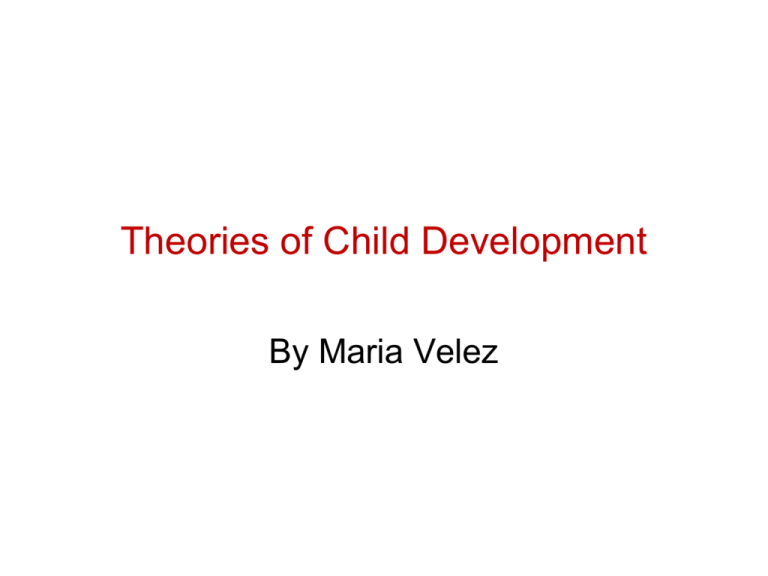
Theories of Child Development By Maria Velez Traditional Education • • • • Teacher centered Absolute control by teacher Learning was from text and teacher lecture Students are expected to repeat information either orally or in written form (Brewer, 42) John Dewey • As a progressive educator, he shared with, Montessori, Piaget and Lev Vygotsky. • • “Education should be child centered” “Education must be both active and interactive.” “Education must involve the social • world of the child and the community.” John Dewey 1859-1952 • American psychologist, philosopher, educator, social critic, political activist, theorist and educational consultant. • Educator who has most influenced our thinking about education in the United States. • “Education is not preparation for life; education is life itself.” • “If we teach today’s students as we taught yesterday’s, we rob them of tomorrow.” Dewey’s Beliefs • Education is living; present experiences arises from interaction between past experience and present situation. • Education consists in the interactions of students with the curriculum in order to make them part of their own knowledge. The teacher’s role should be that of facilitator or guide. • The belief that all genuine education comes about through experience does not mean that all experiences are genuinely or equally educative.” •Teacher must be sensitive to the values and needs of families. The values and cultures of families and communities should be reflected in and deepened by what happens at school. •Teachers do not only teach individual children but also shape the society. They teach children how to live in society. •Children learn best when they interact with other people, working side by side and cooperatively with peers and adults. •The interest and background of each child and group must be considered when teachers plan learning experiences. Maria Montessori 1870-1952 (82) • Italian brilliant woman and an astute observer because she had trained as a scientist. She determined that the problems existed no in the children, but in the adults, in their approaches and in the environments they provided. • Her work provided a foundation for the work of such later theorists as Piaget and Vygostsky. • “The only way to know how to schedule the day and manage behavior is through observation.” • There are diversity among early childhood Montessori Programs. Some of them hold very firmly to Montessori principles, and some of them would never meet Montessori’s own standards. Montessori’s Beliefs • • • Environment includes not only the space the children use and the furnishings and materials within that space but also the adults and the children who share their days with each other, as well as the outdoor environment and other places where children learn. Environment for children need to be beautiful and orderly so that children can learn order from them. Child-sized tools and furnishings were not available and she involved in making her own materials. •Teacher has a responsibility to provide wonderful sights, textures, sounds, and smells for children. •Provide real tools that work. •Keep Materials and Equipment Accessible to the Children. •When children choose what they will do and how and when they will do it, the teachers have more time to observe and assist children individually. •Allow children to take responsibilities. •Teach little and observe much. •Children learn language and other significant life skills without conscious effort from the environments where they spend their time. •Children learn best through sensory experiences. •Children want and need to care for themselves and their surroundings. (Adults spent too much time “serving” children.) Erik Erikson 1902-1994 (92) • Germany artist and teacher. He became interested in psychology when he met Anna Freud, psychoanalyst and the daughter of Sigmund Freud, she convinced Erickson to study and specialized in child psychoanalysis. • Erickson’s work has importance for every early childhood educator because it shows how children develop the foundation for emotional and social development and mental health. • • Erikson’s theory of psychosocial development, which is called the Eight Ages of Man, covers the entire life span of a human being. Erikson gave us the term “identity Crisis.” He considered it inevitable that young people experience conflict as they grow and change into adults. “Erikson’s 8 Stages of Psychosocial Development” Erikson’s Beliefs “Erikson’s 8 Stages of Psychosocal Development” Erikson’s Beliefs Trust vs. Mistrust (0-1) • Hold babies during feedings • Respond to signals of distress • Support babie’s attachment through primary caregiving. Autonomy vs. Shame and Doubt (1-3) • Give children simple choices. • Eliminate false choices. • Set clear limits for children. • Accept alternating needs for independence and dependence. Initiative vs. Guilt (3-6) • Encourage children to be as independent as possible. • Focus on gains as children practice new skills, not on the mistakes they make along the way. • Set expectations that are in line with children’s individual abilities. Consider individual differences. • Focus curriculum on real things and on doing. Trust vs. Mistrust (0-1) • Hold babies during feedings • Respond to signals of distress • Support babie’s attachment through primary caregiving. Jean Piaget 1896-1980 (84) • Switzerland, a budding scientist who published a scholarly paper at the age of eleven.Psychologist, but really an epistemologist (someone who studies the nature and beginning of knowledge). • Piaget’s work has been a primary influence in preschool programs in the United States sin the 1970s. • • • • • • • • • There Are Three Basic Components To Piaget's Cognitive Theory: Schemas: (building blocks of knowledge / intelligent behavior). Intellectual growth as a process of Adaptation (adjustment) to the world. This happens through: Assimilation Accommodation Equilibration Stages of Development: sensorimotor, preoperational, concrete operational, formal operational. Jean Piaget’s Beliefs There Are Three Basic Components To Piaget's Cognitive Theory: Schemas • (building blocks of knowledge / intelligent behavior). Intellectual growth as a process of adaptation (adjustment) to the world. This happens through: Assimilation: whish is using an existing schema to deal with a new object or situation. Accommodation: This happens when the existing schema (knowledge) does not work, and needs to be changed to deal with a new object or situation. Equilibration: occurs when a child’s schemas can deal with most new information through assimilation. However, an unpleasant state of desequilibrium occurs when new information cannot be fitted into existing schemas (assimilation). Equilibration drives the learning process as we do not like to be frustrated and will seek to restore balance by mastering the new challenge (accommodation) Stages of Development: Child’s cognitive development or constructing a mental model of the world. sensorimotor, (0-2 yrs.) – Preoperational, (2-7 yrs. Concrete operational, ( 7-11 yrs.) formal operational. (11 yrs +..) Jean Piaget’s Beliefs Stages of Development: Child’s cognitive development or constructing a mental model of the world. sensorimotor, (0-2 yrs.) – Object Permanence – (Learn through the senses, reflexes and mnaipulate materials. Preoperational, (2-7 yrs.) Egocentrism (Form ideas based on their percetions, can only focus on one varialbe at a time, overgenteralized based on limited experience. concrete operational, ( 7-11 yrs.) Conservation (Form ideas based on reasoning, limit thinking to objects and familiar events. formal operational. (11 yrs +..) Manipulate ideas in head, e.g. Abstract Reasoning. (Think conceptaully, think hypothetically. Piaget’s Beliefs • • • • • • Humans grow and progress through a series of measurable and predictable stages of development from birth to death. Developmentally appropriate education with environments, curriculum, materials and instruction that are consistenly with student's physical and cognitive abilities as well as their social and emotional needs. A focus on the process of children's thinking, not just its products Recognition of the crucial role of children's self-initiated, active involvement in learning activities Trying to speed up and accelerate children's process through the stages could be worse than no teaching at all. Provide a rich stimulating environment •Teachers should present learning material interesting to them or in such a way that the material will inspire them can awaken the child’s motivation. (Living, 2012) •A learner cannot assimilate certain knowledge until the student is cognitively ready can also apply to adults (Livingston, 2012). •Children are encourage to discover themselves through spontaneous interaction with the environment, rather than the presentation of ready-made knowledge. •Acceptance of individual differences in developmental progress •Children learn through discovery. •The child explores and begins to understand in more complex ways as he or she grows and matures. •Children learn effectively through internal motivation rather than memorization. • Avoid lessons that are very different from the child's world. Lev Vygotsky 1896-1934 (38) • Russian, he was particularly interested in cognitive and language development and their relationships to learning. • Vygotsky studied and responded to the work of contemporaries Sigmund Freud, Jean Piaget, and Maria Montessori. • He shows tha social and cognitive development work together and build on each other • “Learning and development are interrelated from the child\s very first day of life” Vygotsky’s Beliefs Understanding Childhood Positive Impact For School Thank You Resources 1. Brewer, J.A, (2007). Introduction to Early Childhood Education. Boston, Massachussetts: Pearson. 2. Field, R. (207. John Dewey. In the Internet Encryclopedia of Philosophy (Web). From http:/iep.utm.edu/d/dewey.htm 3. http://www.slideshare.net/lrickes/john-dewey-powerpoint 4. https://en.wikipedia.org/wiki/Student-centred_learning 5.https://montessori.org.au/montessori/biography.htm 6. http://psychology.about.com/od/profilesofmajorthinkers/p/bio_erikson.htm 7. https://en.wikipedia.org/wiki/Jean_Piaget 8. http://psychology.about.com/od/profilesmz/p/vygotsky.htm 9. http://www.child-development-guide.com/normal-child-development.html 10. http://courses.education.illinois.edu/edpsy313/notes/hh03.htm
